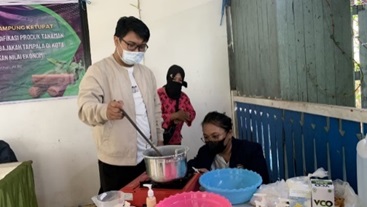Pemberdayaan Masyarakat Melalui Inovasi Pembuatan Sabun Padat Bajakah Tampala (Spatholobus littoralis Hassk) pada Masyarakat Kampung Ketupat Samarinda Community Empowerment Through Innovation in Making Bajakah Tampala Solid Soap (Patholobus littoralis Hassk) in the Community of Ketupat Village, Samarinda
Main Article Content
Abstract
Bajakah tampala is a plant native to Kalimantan that can be found in forests in the interior of Kalimantan. The use of Bajakah Tampala wood is not widely known by most people. One of the uses of Bajakah Tampala wood is that it can be used as an economically valuable product. This community service takes the form of an empowerment program for PKK and Dasawisma women to provide training in making bajakah solid soap. However, before that, education or outreach was carried out regarding solid soap. Of all participants, 22.2% answered that they knew the process of making solid soap, 44.4% knew about solid soap which has a steel composition, and 20% had an understanding of making solid soap. The results of community service activities showed an increase in the total understanding of participants to 100% answered that they knew the process of making solid soap, 100% answered that they knew about solid soap which has a steel composition, and 100% answered that they understood the process of making solid soap. This activity concludes that all participants can better understand the process of making solid soap products and can feel the benefits of Bajakah solid soap.
Downloads
Article Details

This work is licensed under a Creative Commons Attribution-ShareAlike 4.0 International License.
Authors who publish with this journal agree to the following terms:
- Any article on the copyright is retained by the author(s).
- Author grant the journal, right of first publication with the work simultaneously licensed under a Creative Commons Attribution License that allows others to share work with acknowledgment of the work authors and initial publications in this journal.
- Authors are able to enter into a separate, additional contractual arrangements for non-exclusive distribution of published articles of work (eg, post-institutional repository) or publish it in a book, with acknowledgment of its initial publication in this journal.
- Authors are permitted and encouraged to post their work online (e.g., in institutional repositories or on their websites) prior to and during the submission process, as can lead to productive exchanges, as well as earlier and greater citation of published work.
- The article and any associated published material is distributed under the Creative Commons Attribution-ShareAlike 4.0 International License
References
Aliviyanti, R. U. Y., Sudibyo, R. S., & Murwanti, R. (2021). Efek Sitotoksik Beberapa Akar Bajakah Kalimantan Terhadap Sel Kanker Payudara T47D. Jurnal Penelitian Saintek, 26(2), Article 2. https://doi.org/10.21831/jps.v26i2.41211
Amiani, W., Fahrizal, M. R., & Aprelea, R. N. (2022). Kandungan Metabolit Sekunder dan Aktivitas Tanaman Bajakah Sebagai Agen Antioksidan. Jurnal Health Sains, 3(4), Article 4. https://doi.org/10.46799/jhs.v3i4.461
Febriyanti, R., Putra Mahardika, M., & Ardiyanto, R. (2021). Skrining Fitokimia Pada Ekstrak Hasil Proses Infundasi Akar Bajakah [PhD Thesis, Politeknik Harapan Bersama]. http://eprints.poltektegal.ac.id/993/
Iskandar, D., & Warsidah. (2020). Qualitative Phytochemical Screening and Antioxidant Activity of Ethanol Root Extract of Spatholobus littoralis Hassk. The Journal of Food and Medicinal Plants, 1(1), Article 1. https://doi.org/10.25077/jfmp.1.1.13-15.2020
Noval, N., Nastiti, K., Nugraha, D. F., Rahmadani, R., & Alawiyah, T. (2020). Produk inovasi hand sanitizer dari akar bajakah sebagai upaya pencegahan di masa pandemi covid-19. LOGISTA-Jurnal Ilmiah Pengabdian Kepada Masyarakat, 4(2), 305–312.
Panche, A. N., Diwan, A. D., & Chandra, S. R. (2016). Flavonoids: An overview. Journal of Nutritional Science, 5, e47.
Pangestika, W., Abrian, S., & Adauwiyah, R. (2021). Pembuatan Sabun Mandi Padat Dengan Penambahan Ekstrak Daun Avicennia Marina. Jurnal Teknologi Agro-Industri, 8(2), Article 2. https://doi.org/10.34128/jtai.v8i2.146
Saputera, M. M. A., & Ayuchecaria, N. (2018). Uji Efektivitas Ekstrak Etanolik Batang Bajakah Tampala (Spatholobus littoralis Hassk.) Terhadap Waktu Penyembuhan Luka. Jurnal Ilmiah Ibnu Sina, 3(2), 318–327. https://doi.org/10.36387/jiis.v3i2.185
Sofia, N., Yuniarti, Y., & Rosidah, R. (2022). Uji Fitokimia Terhadap Tanaman Obat Kratom (Mitragyna speciosa) DI KHDTK ULM. Jurnal Sylva Scienteae, 5(2), Article 2. https://doi.org/10.20527/jss.v5i2.5356
Suleman, A. W., & Latu, S. (2023). Uji Aktivitas Antibakteri Kayu Bajakah (Spatholobus littoralis Hassk) Terhadap Pertumbuhan Staphylococcus aureus. Lumbung Farmasi: Jurnal Ilmu Kefarmasian, 4(1), 108–114. https://doi.org/10.31764/lf.v4i1.11418
